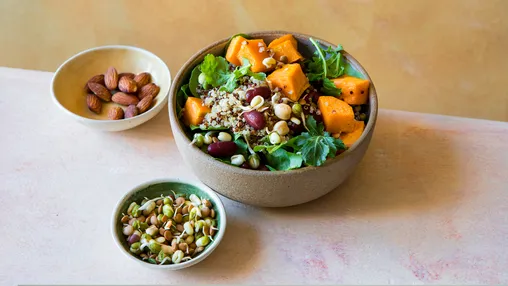Introduction: The Gut Health Revolution
Over the past decade, fermented foods for gut health have moved from niche science into a full-blown wellness revolution. More and more people are discovering that the trillions of microbes living in our digestive system—the microbiome—play a major role in digestion, immunity, mood, and long-term health. At the center of this movement are naturally fermented foods, rich in probiotics and bioactive compounds that nourish the gut. Among the most popular are kimchi, kefir, and kombucha—each bringing centuries of tradition, unique flavors, and powerful benefits for gut health.
This article explores these three superstar fermented foods in detail: their history, nutritional value, health benefits, and practical ways to add them to your diet. By the end, you’ll know exactly how to harness the power of fermentation for better digestion and overall wellness.
What Are Fermented Foods?
If you’re new to fermented foods, it’s best to start small. Introducing them too quickly may cause mild bloating as your gut adjusts. Begin with one type—such as a few spoonfuls of kimchi or half a cup of kefir daily—and gradually expand your variety. Drinking kombucha a few times a week is another simple and effective way to ease into fermented foods for gut health without overwhelming your digestive system.
Types of Fermentation
- Lactic Acid Fermentation: Used in kimchi, yogurt, and sauerkraut. Lactobacillus bacteria break down sugars into lactic acid.
- Alcohol Fermentation: Yeasts convert sugars into alcohol and carbon dioxide (used in beer, wine, bread).
- Acetic Acid Fermentation: Bacteria convert alcohol into vinegar (used in kombucha’s secondary fermentation).
The result? Foods that are alive with beneficial microbes and compounds that support gut health.
How to Start Eating Fermented Foods
If you’re new to fermented foods, it’s best to start small. Introducing them too quickly may cause mild bloating as your gut adjusts. Begin with one type—such as a few spoonfuls of kimchi or half a cup of kefir daily—and gradually expand your variety. Drinking kombucha a few times a week is another simple and effective way to ease into fermented foods for gut health without overwhelming your digestive system.
Why Gut Health Matters
Your gut is often called the “second brain.” Roughly 70% of your immune system is located in the gut, and the gut-brain axis links digestion directly to mood and mental health. A healthy gut microbiome helps:
- Improve nutrient absorption
- Strengthen immunity
- Balance hormones
- Reduce inflammation
- Support mental well-being
Poor gut health, on the other hand, has been linked to digestive disorders, autoimmune conditions, obesity, anxiety, and depression.
Fermented foods like kimchi, kefir, and kombucha help restore microbial balance by introducing beneficial probiotics into the gut ecosystem.
Kimchi: Korea’s Probiotic Powerhouse
What Is Kimchi?
Kimchi is a traditional Korean dish made by fermenting vegetables—most commonly napa cabbage and radishes—with chili pepper, garlic, ginger, fish sauce, and salt. With a spicy, tangy kick, it’s both a culinary staple and a health elixir.
Nutritional Profile
- Probiotics: Rich in Lactobacillus kimchii and other strains
- Vitamins: High in vitamins A, C, and K
- Fiber: Supports digestion and satiety
- Antioxidants: From garlic, chili, and ginger
Kimchi Benefits for Bloating and Digestion
Kimchi’s rich probiotic content helps break down complex carbohydrates, easing digestion and reducing uncomfortable bloating. Its natural fiber promotes regularity, while the garlic, ginger, and chili spices stimulate gastric juices to improve gut motility and nutrient absorption. Together, these properties make kimchi a flavorful and functional food for daily gut health support.
How to Eat Kimchi
- As a side dish with rice or noodles
- In stews (kimchi jjigae)
- Inside sandwiches, tacos, or wraps
- Mixed into fried rice or scrambled eggs
Kefir: The Ancient Fermented Milk Drink
What Is Kefir?
Kefir is a tangy, yogurt-like drink made by fermenting milk with kefir “grains”—a symbiotic culture of bacteria and yeast (SCOBY). Originating from the Caucasus Mountains, kefir has been consumed for centuries as a health tonic.
Nutritional Profile
- Probiotics: Up to 30+ strains of bacteria and yeast
- Protein: Complete protein with all essential amino acids
- Calcium & Vitamin D: Supports bone health
- Bioactive Peptides: Anti-inflammatory properties
Kefir vs. Yogurt for Gut Bacteria
While both kefir and yogurt are probiotic-rich, kefir generally contains more diverse strains of bacteria and yeast, making it a more potent source of probiotics. Yogurt tends to be thicker and milder, while kefir is more liquid and tart.
Easy Homemade Kefir Recipe
- Add 1–2 tablespoons of kefir grains to a clean glass jar.
- Pour in 2 cups of fresh milk (cow, goat, or dairy-free alternatives).
- Cover with a breathable cloth and let ferment at room temperature for 24 hours.
- Strain the grains and store your kefir in the fridge.
- Reuse the grains to make your next batch.
Where to Buy Kefir Grains Locally
You can often find kefir grains in health food stores, at farmers’ markets, or from online fermentation communities. Some local wellness groups also share grains for free.
How to Use Kefir
- Drink plain as a snack or breakfast
- Blend into smoothies with fruit
- Use as a base for salad dressings
- Replace buttermilk in baking
Kombucha: The Sparkling Tea Elixir
What Is Kombucha?
Kombucha is a fermented tea made by combining sweetened black or green tea with a SCOBY (symbiotic culture of bacteria and yeast). The result is a fizzy, tangy, slightly sweet beverage often flavored with fruit, herbs, or spices.
Nutritional Profile
- Probiotics: Multiple strains of bacteria and yeast
- Antioxidants: From tea polyphenols
- Organic Acids: Acetic, gluconic, and lactic acids
- B Vitamins: Supports energy metabolism
How to Make Kombucha at Home (First Time)
- Brew 4 cups of black or green tea and dissolve ½ cup of sugar.
- Allow to cool, then pour into a glass jar.
- Add 1 SCOBY and 1 cup of starter tea (from a previous batch or store-bought raw kombucha).
- Cover with a cloth and let ferment at room temperature for 7–10 days.
- Taste test—when tangy enough, bottle and refrigerate.
Health Benefits of Kombucha
- Detoxification: Organic acids support liver function.
- Gut Balance: Probiotics repopulate beneficial bacteria.
- Energy Boost: Contains B vitamins and small amounts of caffeine.
- Antioxidant Protection: Helps combat oxidative stress.
Best Probiotic Foods for IBS Symptoms
People with IBS (Irritable Bowel Syndrome) often find relief from probiotic foods. Kefir, kimchi, and kombucha can reduce bloating, support regular bowel movements, and balance gut bacteria. Start with small amounts and track symptoms to see which works best for your body.
Comparing Kimchi, Kefir & Kombucha
| Feature | Kimchi | Kefir | Kombucha |
|---|---|---|---|
| Base Ingredient | Vegetables (cabbage, radish) | Milk (or dairy-free alternatives) | Sweetened tea |
| Fermentation Type | Lactic acid | Lactic acid + yeast | Yeast + acetic acid bacteria |
| Key Nutrients | Fiber, vitamins A & C | Protein, calcium, vitamin K2 | Antioxidants, B vitamins |
| Best For | Digestion, immunity | Bone health, gut diversity | Detoxification, energy |
Fermented Foods for Beginners
If you’re just starting, here are a few easy options:
- Kimchi: Available in most grocery stores and easy to enjoy as a side dish with meals.
- Kefir: Commonly found in health food stores or easily made at home using kefir grains.
- Kombucha: Widely sold in bottles at supermarkets, cafés, and health stores, or brewed at home with a starter culture.
Focus on consistency—adding small daily servings of any fermented food can gradually improve gut health.
Safety Considerations
- Watch for added sugars in commercial kombucha.
- Check sodium levels in kimchi if you have high blood pressure.
- Lactose-sensitive individuals should choose dairy-free kefir.
- Start slowly: Too much at once can cause bloating or digestive upset.
Frequently Asked Questions (FAQs)
1. How often should I eat fermented foods?
A small serving daily (½ cup kefir, ½ cup kombucha, or 2–3 tablespoons kimchi) is a great start.
2. Can I eat all three together?
Yes! Diversity is key to a thriving gut microbiome.
3. Are fermented foods safe during pregnancy?
Generally yes, but avoid unpasteurized kombucha due to trace alcohol. Always consult your healthcare provider.
4. Can fermented foods replace probiotics supplements?
For many people, yes—whole foods offer probiotics along with fiber and bioactive compounds.
Conclusion: Fermentation as a Path to Wellness
Kimchi, kefir, and kombucha are more than trendy superfoods—they are time-tested staples that deliver powerful fermented foods for gut health benefits. Whether your goal is improving digestion, boosting immunity, managing IBS symptoms, or simply adding more flavor to your meals, these fermented foods provide a natural solution supported by both tradition and science. Incorporating them into your lifestyle is a delicious and sustainable way to nurture your microbiome and overall well-being.
By incorporating them into your diet, you’re not just eating—you’re cultivating a healthier, more resilient microbiome that can support your health for years to come.
Frequently Asked Questions (FAQs)
1. How do I start eating fermented foods if I’m new to them?
If you’re new to fermented foods, it’s best to start small. Introducing them too quickly may cause mild bloating as your gut adjusts. Begin with small portions—just a few spoonfuls of kimchi, half a cup of kefir, or a few sips of kombucha per day. As your gut adjusts, you can gradually increase the amount and variety of fermented foods for gut health to suit your comfort level.
2. Are fermented foods safe for everyone?
For most people, yes. However, individuals with compromised immune systems, certain medical conditions, or pregnant women should consult a healthcare provider before consuming unpasteurized fermented foods.
3. Can fermented foods help with bloating?
Yes. Kimchi, kefir, and kombucha provide probiotics that support digestion and reduce gas and bloating. Start with small amounts to avoid temporary discomfort as your gut adjusts.
4. What’s the difference between kefir and yogurt?
Both are probiotic dairy products, but kefir contains more diverse bacteria and yeast strains, making it more potent for gut health. Yogurt is thicker, while kefir is drinkable.
5. How can I make kefir at home?
Add kefir grains to milk, cover the jar, and let it ferment for 24 hours. Strain out the grains, store the liquid in the fridge, and reuse the grains for your next batch.
6. Is kombucha safe to make at home?
Yes, but cleanliness is key. Always use sterilized jars and utensils. Home-brewed kombucha can have trace alcohol, so be cautious if avoiding alcohol.
7. Can fermented foods improve IBS symptoms?
They may help. Probiotics in fermented foods support gut bacteria balance, which can ease symptoms like bloating and irregular bowel movements. Introduce them slowly to see how your body responds.
8. Where can I buy kefir grains locally?
Check local health food stores, farmers’ markets, or community groups. Online fermentation forums and shops also sell high-quality kefir grains.
9. How often should I drink kombucha?
1 cup (about 240ml) a few times a week is safe for most people. Avoid drinking large amounts daily if you’re sensitive to caffeine or acidity.
10. Can fermented foods replace probiotic supplements?
Yes, for many people. Fermented foods deliver probiotics in a natural form, along with vitamins, minerals, and fiber that supplements don’t always provide.
Eating in sync with your body clock doesn’t just help your stomach — it also supports a calmer, more focused mind. If you want to explore more ways to care for your mental wellbeing, check out our full guide on practical tips for better mental health.
For more tips and support, visit our Facebook page.







